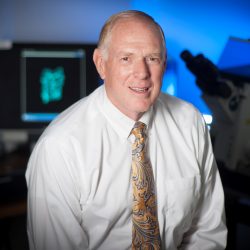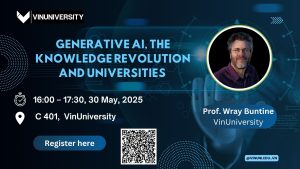A New Generation of Targeted Therapies for Cancer, Autoimmune, and Infectious Diseases
Speaker: Dr. Philip S. Low, Presidential Scholar for Drug Discovery & Ralph C. Corley Distinguished Professor of Chemistry – Biochemistry, Department of Chemistry, Purdue University
Monday, May 30, 2022 | 4.30 – 5.30 pm (Hanoi time)
Ball-Room G104 | Zoom Meeting

Abstract: We are exploring the use of high affinity targeting ligands to deliver attached drugs specifically into diseased cells, thereby simultaneously improving their potencies and reducing their off-target toxicities. For this purpose, we have designed targeting ligands for many human cancers, viruses and virus-infected cells, bone fracture surfaces, inflammatory macrophages, regulatory T cells, cancer associated fibroblasts, myeloid derived suppressor cells, antigen presenting cells, and tumor associated fibroblasts among others. Our tumor-targeted fluorescent dyes (one FDA-approved, two in clinical trials) are beginning to revolutionize cancer surgeries by enabling surgeons to find far more malignant lesions than previously possible. Our PSMA-targeted DOTA conjugate (177Lu-PSMA-617; phase 3 completed; awarded Breakthrough Status) has generated more than 40% response rates in refractory metastatic castration-resistant prostate cancer, offering hope for patients with previously untreatable tumors. Our tumor associated macrophage-targeted TLR7 agonists and regulatory T cell targeted immune stimulants enable the suppression of growth of nearly all solid tumors, and our universal CAR T cell therapies (clinical trials in 2022) have repeatedly shown an ability to eradicate solid tumors in animals. Our recently launched bone fracture-targeted anabolic agents (clinical trials in 2022) are reducing fracture healing times in animals by more than 60% while generating repaired bone that is stronger than healthy bone, and our fibroblast activation protein-targeted PI3K inhibitor (preclinical) is halting fibrosis in animal models of fibrotic diseases. Our influenza-targeted immunotherapy is 80X more potent than Tamiflu, and similar targeted immunotherapies for other viral diseases are undergoing development. Finally, our therapy for malaria (phase 3 clinical trials in SE Asia) is eliminating parasitemia in all patients in <3 days, and our nontoxic treatment for sickle cell disease (phase 1 clinical trials) shows promise for alleviating the causes of SCD. In my seminar, I will briefly summarize the structures, biological activities, preclinical data and clinical results (where available) for each of these therapies.
Bio: Dr. Philip S. Low is the Presidential Scholar for Drug Discovery and the Ralph C. Corley Distinguished Professor of Chemistry at Purdue University. Dr. Low has spent over 35 years designing targeted imaging and therapeutic agents for the diagnosis and treatment of many human diseases. Included among the diseases for which he has developed therapies are malaria, multiple cancers, sickle cell disease, idiopathic pulmonary fibrosis, bone fractures, rheumatoid arthritis, and several virus infections. Seven drugs from Low’s research are currently undergoing human clinical trials, one of which (Cytalux) was approved by the FDA in November 2021 and a second (Pluvicto; Lu-PSMA-617) received “Breakthrough Therapy Status” from the FDA and was approved in March 2022. To accelerate development of his drugs, Low has founded seven successful companies (Endocyte Inc., OnTarget Laboratories Inc., Umoja Biopharma, Morphimmune Inc., Novosteo Inc., Eradivir Inc. and ErythroCure Inc.). Low has published over 550 scientific articles (H-index of 115) and has over 200 US patents/patents pending. Low has also been recognized with many national and international awards, including the AACR Award for Chemistry in Cancer Research, the ACS Award for Cancer Research (Sosnovsky Award), an NIH MERIT Award and the ACS Award (Esselen Award) for Chemistry in the Public Interest among others. In his spare time, Low likes skiing, hiking, golfing and playing with his grandkids. Dr. Low received his B.S. in Chemistry from BYU (1971) and his Ph.D. in Biochemistry from UCSD (1975).



